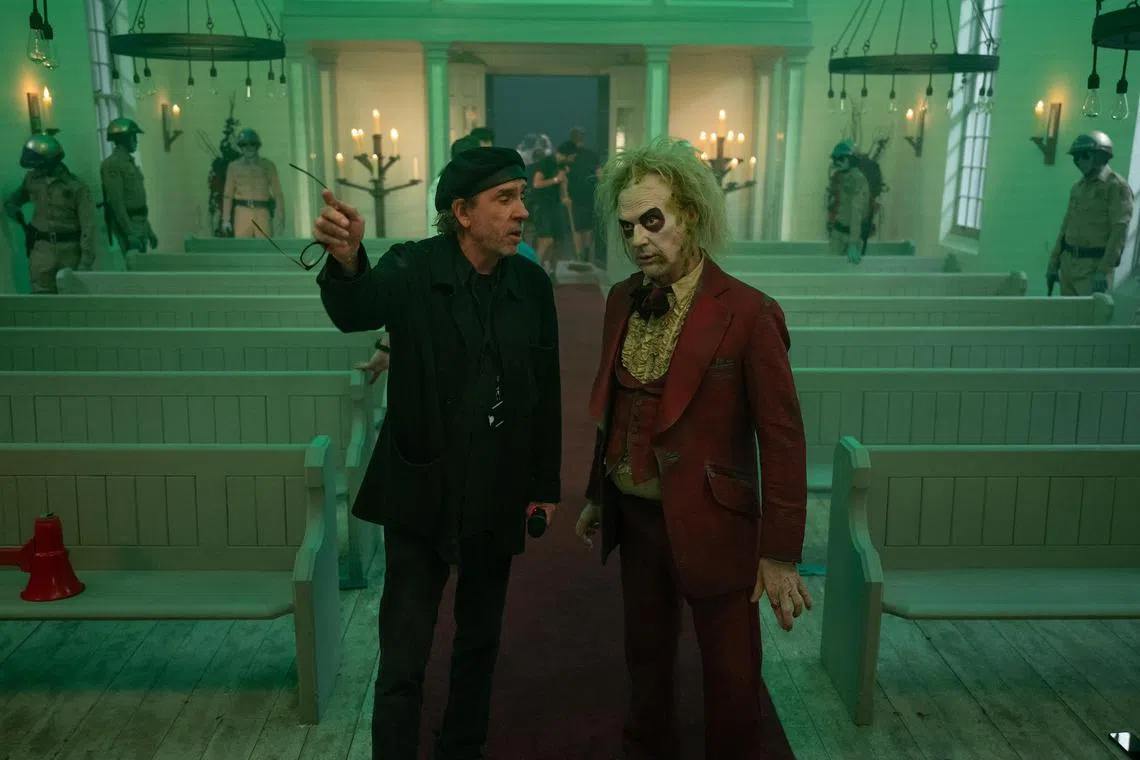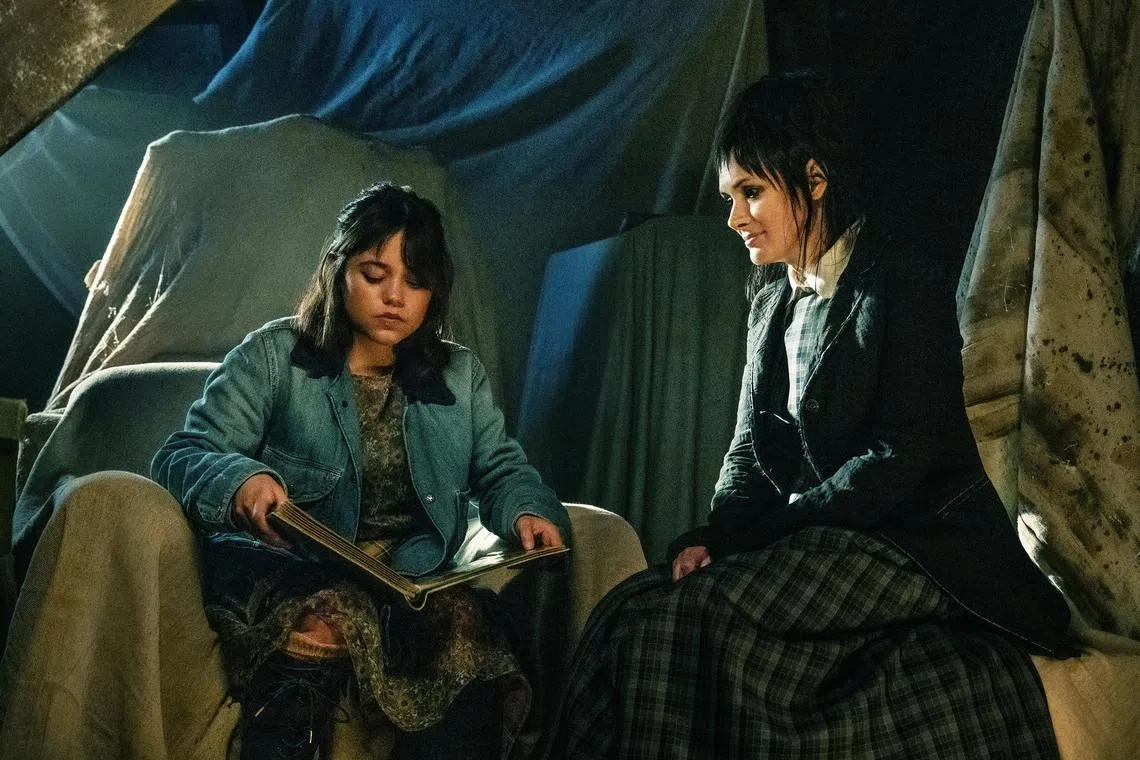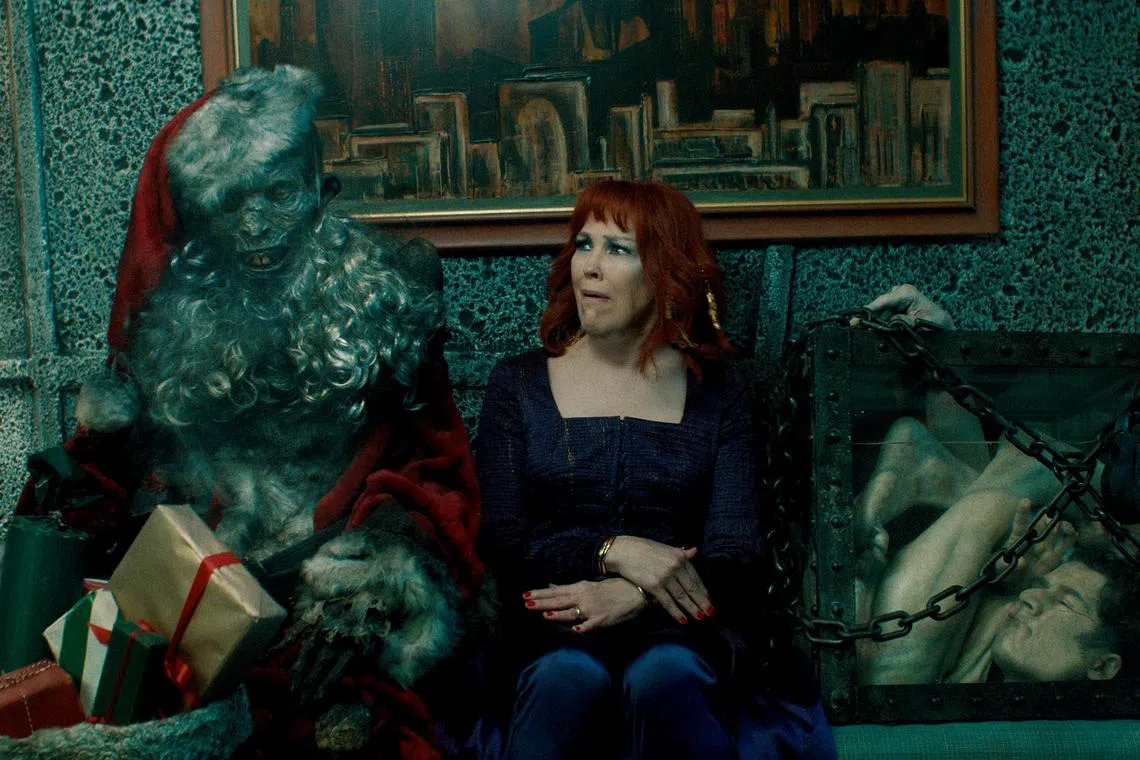How the Beetlejuice Beetlejuice reunion came together
Sign up now: Get ST's newsletters delivered to your inbox

(From left) Michael Keaton, Catherine O'Hara, Winona Ryder and Tim Burton at the Beetlejuice Beetlejuice photo call in New York on Aug 17.
PHOTO: AFP
NEW YORK – If you wonder why it took 36 years for horror comedy Beetlejuice (1988) to spawn a sequel, consider how complicated it was simply to reunite its busy principals for a video call in July.
American director Tim Burton, 66, joined from the south of France, where he was editing the second season of the Netflix series Wednesday (2022 to present), while American actress Winona Ryder, 52, signed on from Atlanta, on a brief break from filming the final season of Netflix series Stranger Things (2016 to present).
American actor Michael Keaton, 72, spent the call roaming a cabin he had built in rural Montana – “I’m reheating coffee, if you want some,” he told the group – while Canadian actress Catherine O’Hara, 70, the last to sign on, did so from her cottage in Ontario, Canada.
Still, even on a video call that catered to a torturous number of time zones, the quartet’s comic chemistry remained strong. Ryder said revisiting their decades-old bond was the best part of making Beetlejuice Beetlejuice, which opened the Venice Film Festival on Aug 28.
“It was nostalgic, but not in any saccharine sense. It went straight to the heart,” said Ryder.
In the original, the newly dead couple Barbara and Adam Maitland (Geena Davis and Alec Baldwin) marshal all their ghostly might in an attempt to scare away the Deetzes, city slickers who have moved into their Connecticut house. Eccentric hauntings ensue, including a memorable dinner party possession in which Delia Deetz (O’Hara) lurches in time to Harry Belafonte’s 1956 song Day-O.
But when the Maitlands go looking for added firepower, they make the mistake of hiring Beetlejuice (Keaton), a trickster spirit who plays by his own rules and has romantic designs on the Deetzes’ daughter, the dark and morbid Lydia (Ryder).
The new film picks up decades later as Lydia, now the host of an exploitative paranormal reality series, heads back home with her stepmother Delia and sceptical daughter Astrid (Jenna Ortega) in tow. Meanwhile, Beetlejuice lies in wait, still pining for the Goth girl that got away.
For Burton, whose recent projects have been lavishly budgeted and full of computer-generated enhancement, Beetlejuice Beetlejuice offered a welcome opportunity to get back to basics, returning to the eccentric practical effects that characterised his early career.
“I realised I got caught up in the Hollywood thing,” he said. “For me to be successful, I have to really try to do something from the heart, something that means something to me.”
He gestured to his cast’s faces, beaming in thumbnail windows. “Working with all of you did that.”
When you all came together to make the new film, what was it like to see one another again?
Ryder: It was like falling back into it, like no time had passed.
O’Hara: On one of the first days that I was with Michael, you just kept saying, “Do you believe we’re doing this?”
Burton: I almost started crying the first time I saw these people again.
Ryder: I did, I cried. I get emotional talking about it sometimes.
Keaton: I never cry. Only in character.

Director Tim Burton (left) and actor Michael Keaton on the set of Beetlejuice Beetlejuice.
PHOTO: WBEI
Michael, did the success of the first film surprise you?
Keaton: There was a screening, and it did not particularly go well. I remember feeling so bad because I thought, “Oh, man, that was such a fun experience, just absolutely unique and a truly authentic collaboration.”
Then Tim called and said, “Hey, I want to do a real quick reshoot,” and I’m thinking to myself, “Geez, I thought this was done, we were dead in the water.”
We did it and someone sent me a potential trailer, and I thought, “Holy moly, if it gets even close to this, this is really good.”
It kicked off a very fruitful run of collaborations with you and Tim that included Batman (1989).
Keaton: I love working with Tim so much, but I don’t think we ever really analysed why we work pretty well together, we just do. I think I let him down on one movie, but that’s just me, and it bugs me to this day. I was clueless on Dumbo (2019). I sucked in Dumbo.
Burton: I don’t even know what you’re talking about, but whatever.

Tim Burton (right) and Michael Keaton on the set of Beetlejuice Beetlejuice.
PHOTO: WBEI
In a lot of ways, Michael, making Beetlejuice seemed tailored specifically to you.
Keaton: It was freewheeling in the best possible way. It was the ultimate “yes and”: If I did something, Tim would let me go and then he’d throw in another suggestion. I wasn’t there that long. I showed up for 2½ weeks or something. Right, Tim?
Burton: I didn’t realise until after we shot (the sequel) that it almost mirrored the same schedule that we had on the first one. You were probably in this one more than the first movie, but we always said that less is more.
Keaton: Yeah, our agreement was no more Beetlejuice than the last time. If it’s over a minute or two, maybe, but we’ve all seen that failure: “Hey man, those car crashes were really good. Let’s give ’em 50 car crashes.” We both knew, don’t do that.
Winona, there is a through line you could draw from Lydia Deetz to a lot of other dark and sardonic characters in pop culture, like Daria from the animated sitcom (1997 to 2002).
Ryder: That’s so interesting. I never thought about that, but I really loved Daria. Lydia’s very sullen, but there’s also something very pure about her, a very sincere thing that Tim helped me towards. I really identified with Lydia, I think a lot of people do. I’m protective of her, and so is Tim.
Burton: That was my interest in this sequel because you were such a powerful character. For everybody who was a cool teenager, what happens to you as an adult? What’s important to you? What are your relationships like? What happens when you’ve got kids?
For me, this movie couldn’t have been made until now. I understand all these things a bit more because of my own strange journey.

Jenna Ortega (left) and Winona Ryder in Beetlejuice Beetlejuice.
PHOTO: WBEI
Catherine, you met your husband, Bo Welch, on the first film, where he served as the production designer.
O’Hara: Bo was talking to me all through the shoot and never asked me out. Tim said, “Let me see what I can do.”
Ryder: Tim as Cupid!
Burton: It was great.
O’Hara: He begrudgingly asked me out. “Oh, yeah, the art department’s going to a swop meet. You want to come?”
Keaton: The hiccup for poor Catherine was she was married to me at the time. And, god, that was rocky as hell.
O’Hara: You handled it so well, though. Talk about “yes, and”.
Keaton: I did, but let’s face it. We were always in the tabloids, don’t you remember? It was like Richard Burton and Elizabeth Taylor.
O’Hara: I think we were more exciting than they were.

Catherine O’Hara in Beetlejuice Beetlejuice.
PHOTO: WBEI
The sequel uses a lot of practical effects and elaborate make-up, and skimps on the sort of CGI that is commonplace now. It feels like a nod to the original.
Keaton: There is a handmade quality that the audience can’t put their finger on. I was always convinced that was the reason for the success of it and why people like it so much. I thought, “Boy, to do that now, you’re going to get pushback from studios.” But (Tim) stuck to it.
Burton: The great thing is they are acting to something real. You have real sets, you have people with make-up, you have real effects. It helps the creative process if they can see what they’re dealing with.
Ryder: I remember on the first one, with the Handbook For The Recently Deceased, someone actually wrote an entire handbook. I thought it was just a prop. I opened it, and I was like, “This actually makes a lot of sense.”
With all this enthusiasm, why did it take so long to mount a sequel?
Ryder: I was always waiting. I was so up for it. I think the big fear was that it would happen, but Tim would just produce it or something. It had to be all of us.
Keaton: I’d always get asked the question, “If you wanted to make a remake of your movies, what would you remake?” This was always the one, and then I went through a period where I really didn’t want to make it again because I thought there are certain things you don’t touch, you have to just leave them alone.
What’s that great Alan Arkin movie with Peter Falk? I remember reading they’re remaking The In-Laws (1979) and I thought, “Oh, man, don’t do that, just leave that alone.”
I admit, I was nervous about doing this again, even up to the point where we all showed up. It’s a really, really, really hard thing to re-create, but it was the same and better. The quality of each thing seemed to be just a little richer.
Michael, you have been in a lot of acclaimed dramatic projects over the last decade. Was it nice to put all that behind you and just go back to being funny again?
Keaton: Oh, my god, you have no idea. It came around at the right time. And I’m in that zone again, if you’ve got something. NYTIMES
Beetlejuice Beetlejuice opens in Singapore cinemas on Sept 5.


